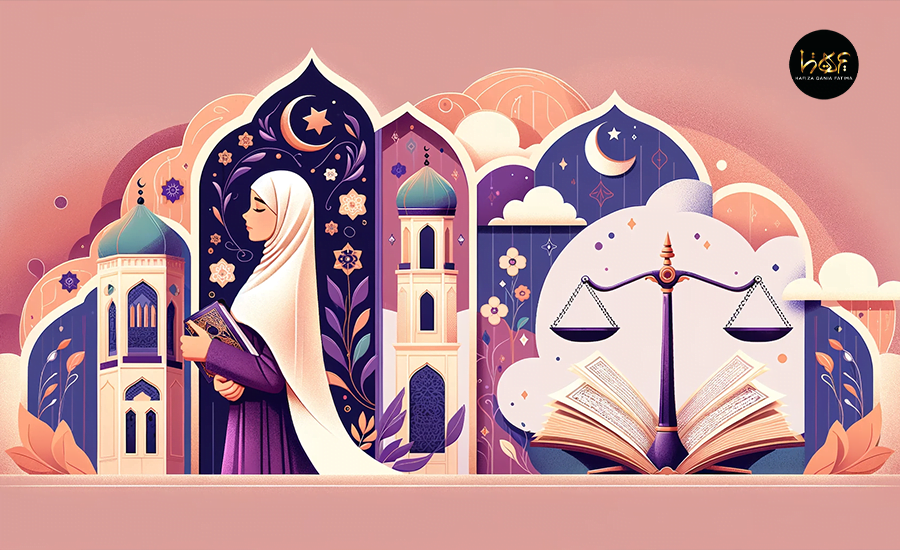
In the story of human civilization, the status and role of women have been pivotal, yet often undervalued. Islam, a faith enriched with deep wisdom and compassion, stands unique in its approach to women’s rights. Nearly 1,400 years ago, Islam not just theoretically, but practically uplifted the status of women, marking a revolutionary shift in human history. This article delves into the profound rights and dignified status accorded to women in Islam, unfolding the layers of respect and equality embedded in its teachings.
The Quranic Perspective on Women
The Holy Quran, by dedicating an entire chapter, Surah al-Nisa (The Women), to women, unequivocally signifies their importance in Islam. This is a direct contradiction to the prevalent notion among some non-Muslims and Muslims alike, that women are secondary in Islam. In truth, Islam venerates women; it abolished pre-Islamic practices that demeaned them, such as infanticide and treating them as property.
Inheritance Rights and Economic Equality
Islam was revolutionary in granting women inheritance rights. Critics often point out that a woman’s share is typically half that of a man’s. However, this is in line with the Islamic principle where the financial responsibility primarily lies with the male members of the family. Thus, this distribution reflects a balance tailored to societal roles and responsibilities.
The Protective Framework for Women in Islam
Islam places great emphasis on the protection and dignity of women. The Quran and Hadith strongly condemn any form of mistreatment or injustice against them. For instance, Allah prescribes severe punishment for those who harm women, ensuring their safety and rights are paramount (Quran, Surah An-Nisa, Ayah 34).
The Multifaceted Roles of Women in Islam
The Exalted Status of Mothers
In Islam, mothers hold a position of unparalleled esteem. The Prophet Muhammad (صَلَّی اللہُ عَلَیْہِ وَسَلَّمَ) emphasized this in numerous hadiths, like, “Paradise lies at the feet of your mother” (Nasai, Hadith 3104), illustrating the profound respect and importance of this role.
Women as Wives: Partnerships of Respect and Love
The role of a wife in Islam is marked by dignity and mutual respect. The Quran beautifully articulates this bond, stating, “wives are the source of husbands’ comfort and peace” (Surah Ar-Room, Ayah 21). The Prophet Muhammad (صَلَّی اللہُ عَلَیْہِ وَسَلَّمَ) reinforced this by declaring, “The best among you are those who are best to their wives” (Tirmidhi, Hadith 3895).
Daughters and Sisters: Cherished and Valued
In Islam, daughters are considered a blessing, a sentiment echoed by the Prophet Muhammad (صَلَّی اللہُ عَلَیْہِ وَسَلَّمَ) when he said, “Whoever is tested with daughters and treats them well, they will be a shield for him against the Fire” (Bukhari, Hadith 1419).
Similarly, sisters in Islam hold a significant place. The Prophet Muhammad (صَلَّی اللہُ عَلَیْہِ وَسَلَّمَ) demonstrated this by honoring his foster sister, highlighting the respect and care due to sisters in Islamic culture.
The Empowerment of Women Through Education
Education holds paramount importance in Islam, and this extends equally to women. Contrary to some societal misconceptions, Islam encourages women’s education, as it is crucial for their personal development and societal contribution. The Prophet Muhammad (صَلَّی اللہُ عَلَیْہِ وَسَلَّمَ) said, “Seeking knowledge is a duty upon every Muslim” (Ibn Majah, Hadith 224), emphasizing that this directive is gender-inclusive.
Confronting and Correcting Misconceptions
Despite the clear teachings of Islam regarding women’s rights, misconceptions persist, often due to cultural practices and lack of knowledge. It is essential to distinguish between cultural practices and true Islamic principles. Islam, in its essence, advocates for the dignity, respect, and equitable treatment of women.
Conclusion:
Islam actively ingrains the rights of women deep within its teachings and practices, far beyond mere theological concepts. From the revered status of mothers to the respectful treatment of wives, daughters, and sisters, Islam has set a precedent for women’s rights and dignity. As humanity progresses, it becomes increasingly clear that the teachings of Islam regarding women were not only progressive for their time but continue to be relevant and empowering in today’s world.
FAQs:
Q: How does Islam ensure the economic rights of women?
A: Islam grants women inheritance rights, ensuring their economic security. Although a woman’s share is typically half that of a man, this reflects the financial responsibilities within a family, where men are chiefly responsible for financial upkeep.
Q: What is the status of mothers in Islam?
A: Mothers are accorded the highest status in Islam. The Prophet Muhammad (صَلَّی اللہُ عَلَیْہِ وَسَلَّمَ) said, “Paradise lies at the feet of your mother” (Nasai, Hadith 3104), emphasizing the immense respect and honor given to mothers.
Q: Does Islam support the education of women?
A: Absolutely, Islam strongly advocates for the education of women. The Prophet Muhammad (صَلَّی اللہُ عَلَیْہِ وَسَلَّمَ) emphasized the importance of seeking knowledge for all Muslims, regardless of gender, as evidenced by his saying, “Seeking knowledge is a duty upon every Muslim” (Ibn Majah, Hadith 224).
Q: What are the rights of daughters in Islam?
A: Daughters in Islam are cherished and valued. The Prophet Muhammad (صَلَّی اللہُ عَلَیْہِ وَسَلَّمَ) said, “Whoever is tested with daughters and treats them well, they will be a shield for him against the Fire” (Bukhari, Hadith 1419), highlighting the importance of kind and fair treatment of daughters.
Q: How does Islam view the role of women as wives?
A: Islam views the role of a wife with great respect and dignity. The Quran states, “wives are the source of husbands’ comfort and peace” (Surah Ar-Room, Ayah 21). Moreover, the Prophet Muhammad (صَلَّی اللہُ عَلَیْہِ وَسَلَّمَ) taught that the best men are those who are best to their wives (Tirmidhi, Hadith 3895), emphasizing the importance of kindness and respect in the marital relationship.
Source:
Dawat e Islami